
Tell us what you need to find a matching loft conversion specialist

Get free quotes from professionals near you

Compare offers and choose the one that best matches your need
- Householdquotes.co.uk
- Driveway
- Budget DIY Driveway
Budget Ideas For The Best DIY Driveway
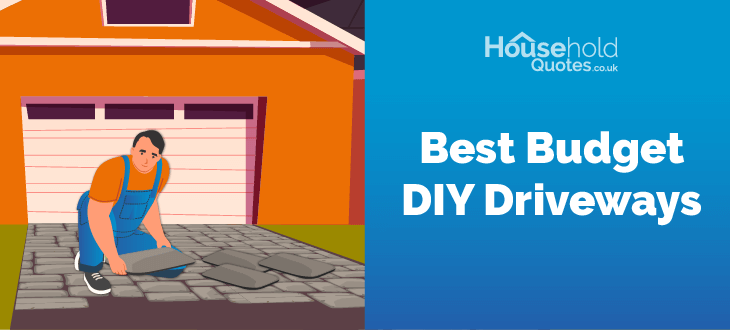
- Gravel is the most cost-effective material for a DIY driveway, with a price range of £35 to £55 per m2.
- To install a driveway, you must excavate the site, install edging, add the sub-base and weed barrier, and lay down the chosen driveway material.
- By doing your own driveway, you can save up to £1,000 on labour costs. The best materials for a DIY driveway project are permeable pavers, gravel, and concrete.
- Poorly installed driveways can cause the material to sink and shift, resulting in costly repairs. It is recommended that you work alongside at least one driveway specialist.
Installing a new or updated driveway can improve your home's functionality and enhance its curb appeal. However, the cost of professional installation can be daunting, especially with rising inflation and living expenses.
Fortunately, you can DIY many types of driveways, saving money and allowing for customisation and personal satisfaction.
In this article, we will explore various budget driveway ideas, from selecting the right materials to laying a driveway properly and incorporating cost-effective accessories.
Whether you prefer a rustic gravel path, a sturdy concrete slab, or a charming brick layout, our guide will help you achieve great results without overspending will help you achieve the best results without breaking the bank.
Choosing the right driveway specialist is important, whether you are working on a DIY project or hiring a professional installer.
Collaborating with a driveway installer can provide valuable guidance for your DIY driveway. Selecting a reliable, local driveway installer can help lower costs and guarantee a strong, long-lasting driveway.
Comparing multiple quotes is vital to guaranteeing the best price on a driveway specialist. HouseHoldQuotes confidently offers four free quotes for local driveway specialists tailored to your preferences and budget.
Fill out our 30-second form to receive these quotes promptly and create the best driveway.
- Describe your needs
- Get free quotes
- Choose the best offer
It only takes 30 seconds

Cheap driveway ideas: what is the best material?
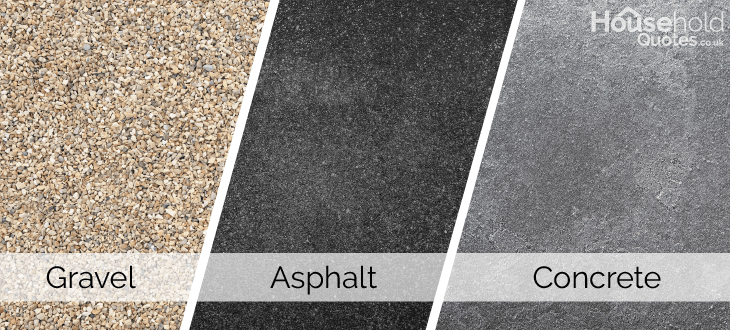
Choosing the best material to balance cost, durability, and aesthetic appeal is essential when considering cheap DIY driveway options. The most cost-effective driveway materials in the UK are:
- Gravel
- Concrete
- Asphalt or Tarmac
When choosing the best material for your DIY driveway, consider factors beyond your budget. For example, consider your area's climate, your home's accessibility, and the size of the driveway.
Some materials are more cost-effective for larger surfaces. Resin, for instance, becomes more economical in larger areas as the cost per unit decreases with the quantity purchased.
While this material may not be as inexpensive as gravel, concrete, or asphalt, it could be more advantageous if you plan to create a larger driveway.
Personal preferences and choices are also crucial. You might prioritise an eco-friendly option over sticking to a budget or achieving a specific aesthetic that suits your home. Ultimately, your driveway should be something you are proud of.
It is essential to carefully assess various materials, weighing their advantages and disadvantages for your DIY driveway. Selecting the wrong material could lead to damage, increased maintenance costs, and an unattractive appearance.
In the following sections, we will provide further details on the best material for affordable driveway ideas and how to achieve the best DIY driveway using these materials.
DIY driveway ideas: the best materials
When considering DIY driveway ideas, it's essential to consider the best materials for your situation. Some driveway materials can be challenging to DIY, while others are relatively easy to install and maintain.
While factors such as your aesthetic preferences, budget, location, and climate should all be considered when choosing the best material, the first consideration should be how easy the material is to install.
Below are the top 3 best materials for a DIY driveway, which are cost-effective and easy to install:
- Gravel is the best driveway material for DIY. It's easy to install and provides excellent drainage, saving you money on a separate drainage system. However, maintaining gravel can be challenging due to the loose stones, which may allow weeds to grow if a weed barrier is not installed.
- Block pavers are highly durable and available in various colours and materials, such as clay, stone, and concrete. They are labour-intensive to install, but the materials are relatively easy to source in bulk. While their materials are accessible, they are considered more expensive than others, such as gravel.
- Tar and chip is similar to asphalt or tarmac but is easier to install than the two. It is also a great material for an existing driveway, as tar and chip materials can be easily poured over an old driveway. However, this material is not as popular as tarmac or asphalt, so it may be difficult to source. Additionally, while it is considered one of the cheapest materials available, it has a much shorter lifespan of 7 to 10 years, which means future costs will be increased.
The options mentioned above are some of the best DIY driveway ideas available and the easiest to install. However, they may not meet your specific needs or preferences. There are many more budget driveway ideas that may be better tailored to you.
DIY resin driveway
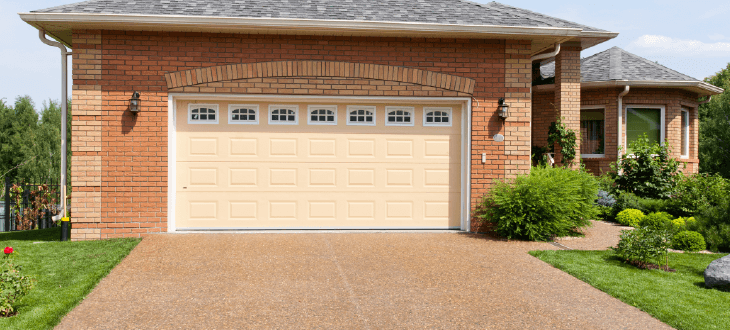
Resin driveways are more challenging to install than other materials like gravel because resin requires more equipment and precise calculations to create a stable and durable driveway surface. However, it's not impossible.
Many people choose DIY resin driveways because they offer exceptional durability, aesthetic appeal, low maintenance, and a smooth surface. Furthermore, a resin-bound driveway will also have good drainage.
To DIY a resin driveway, you will need several different types of equipment, such as:
- Resin-bound kit
- Mixing drill and paddle to mix the components of resin
- Trowel
- Forced action mixer for resin-bound driveways to mix aggregates and resin
- Screed sledge to level the surface and mixture
- A hygrometer will test the humidity, which will help lay the resin driveway.
Once you have the necessary equipment, you can start your DIY resin driveway. First, you need to excavate the site to a depth of 150mm.
After that, place a sub-base MOT type 1 on the excavated site to distribute weight evenly. The resin and aggregates are mixed following the sub-base.
Usually, the mixture is three parts aggregates and one part resin. Still, checking the manufacturer's instructions before mixing is essential, as they may differ slightly.
After mixing, you can spread the resin evenly with a trowel on your driveway. After laying it, use a screed sledge to remove air bubbles to ensure a smooth surface.
Your resin driveway should be left to cure for 24 hours after you use a brush to remove excess and loose aggregates.
Resin driveways are a popular choice. However, they are difficult to install as a do-it-yourself project and more expensive due to the material and equipment required.
On average, resin driveways cost between £60 and £100 per square meter. They cannot withstand heavy traffic like concrete or asphalt driveways and can lift over time, leading to potential future costs.
Consider the advantages and disadvantages of a DIY resin driveway so that you can make an informed decision.
Laying a gravel driveway
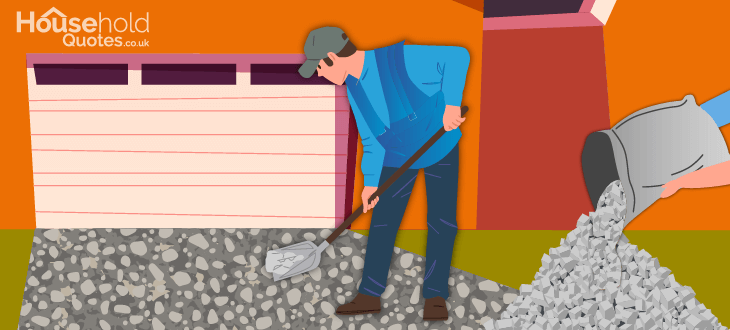
Gravel is considered the cheapest driveway option in the UK. It is plentiful and easy to install, making it one of the best budget driveway ideas for DIY projects. A gravel driveway costs between £35 and £55 per m2 for materials only.
Below is the step-by-step guide on how to lay a gravel driveway.
- First, you must excavate the site for your new driveway around 50mm to 200mm.
- Next, you must calculate the amount of gravel you need. To do this, multiply the driveway's height, length, and depth by the cubic metre needed.
- Once you have the necessary gravel, add the edge restraints so that the gravel stays within the driveway.
- After the edge restraints, add a weed barrier. While not mandatory, it will help prevent weeds from growing in the driveway and reduce maintenance requirements.
- Once the weed barrier is installed, a subbase is laid on top to create a solid foundation. It should be between 100 mm and 150 mm deep. Use a compactor to ensure that the subbase is levelled.
- The final layer consists of decorative gravel, which doesn't contribute to the driveway's structural integrity. When pouring the gravel, it's important not to exceed a depth of 50mm, as this will not strengthen the driveway and will only result in unnecessary costs.
DIY tarmac driveway
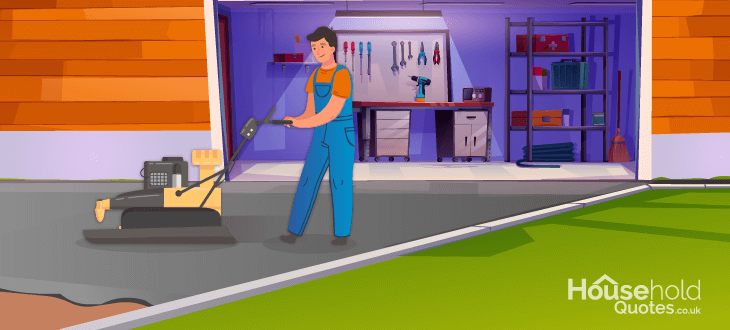
Creating your own tarmac driveway can be challenging. However, if you want to save on costs, tarmac is an excellent budget driveway idea, as the material is readily available.
In addition to being cost-effective, tarmac driveways are popular due to their low maintenance, durability, and ability to last up to 20 years.
However, DIY tarmac driveways can be labour-intensive and difficult. Failure to install the tarmac correctly can lead to potholes and cracks forming, which must be repaired, leading to higher future costs.
To DIY a tarmac driveway, you will need the following equipment:
- Tarmac
- Sub-base material (crushed stone or hardcore)
- Edging material (concrete, wood, or metal)
- Bitumen emulsion (tack coat)
- Weed barrier
- Compactor (vibrating plate or roller)
- Shovels
- Rake
- Wheelbarrow
- Leveling tool
- Tamper
- Protective gear (gloves, mask, goggles)
Like other driveways, you must excavate the area at 175-190mm depth and cover it with 100mm subbase material. A compactor should be used to level out the subbase.
Edge restraints, made from concrete, wood, or metal, contain the tarmac mixture. After these have been installed, a weed barrier is to be laid to prevent the growth of weeds.
Apply a bitumen emulsion to the compacted sub-base. This helps the tarmac bond better to the base layer. Follow the manufacturer's instructions for application.
After the bitumen emulsion is laid, the tarmac is poured 6mm to 10mm thick. After rolling it to ensure a smooth surface, it should be left for 48 hours before use.
Cheap concrete driveways
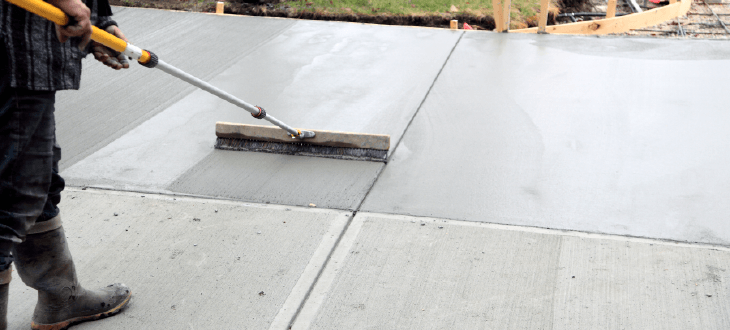
Concrete is an excellent budget driveway idea due to its abundant raw materials and ease of processing, resulting in lower costs.
It offers exceptional strength and durability, making it suitable for driveways and other construction projects like bridges.
However, concrete is less versatile than materials like resin or block pavers, limiting customization options. Additionally, its light colour makes it prone to oil stains, requiring regular maintenance to keep it looking clean.
DIY installation can be challenging due to the labour-intensive nature of pouring concrete. If you want to install a concrete driveway, continue reading and learn the necessary steps.
- Lay out the perimeter of your driveway with wooden stakes.
- Add wooden forms around the perimeter of the driveway. This will help keep the wet concrete stay in place.
- Excavate the driveway to a depth of 150mm to 200mm and level out with a compactor to ensure the foundation is stable.
- Add in the subbase after the soil has been levelled out.
- Next, install reinforced steel rebars in a grid pattern, this will help distribute weight evenly on your concrete DIY driveway.
- Pour the concrete on top of the subbase and steel rebars. Ready-mix concrete, which will be delivered to the site ready to pour, is recommended. The concrete should be poured in even loads and spread with a hoe to ensure a smooth surface.
- Flatten your surface and remove excess concrete using a timber beam, moving horizontally across the concrete slabs.
- Cut contraction joints into the concrete slab around 100mm deep. Contraction joints allow the concrete to expand and contract without cracks.
- Next, use a thick-bristled brush to create a non-slip surface by brushing it up and down the wet concrete.
- Finally, allow the concrete to cure. It will take 7 days to be suitable for personal vehicles, but after 48 hours, it can be used for pedestrian traffic.
How to lay a driveway
Laying a driveway yourself can be an excellent way to reduce labour costs. However, several vital components must be considered before doing so.
Before laying a driveway, checking local building regulations is important to determine if you need planning permission. Even though driveways generally fall under permitted planning in the UK, it's not safe to assume that your driveway won't require planning permission.
Failure to comply with regulations can result in fines and legal action. Homes on protected land or conservation sites require planning permission.
Additionally, if your driveway uses non-permeable materials over an area larger than 5m2, you must add a drainage system to prevent flooding and pollution of local water sources. These are a few examples. Each situation is different, so it is vital to check with local authorities in your area before construction.
When you are confident that your planned driveway complies with regulations, you can start designing and building the new entrance to your home. Here is a guide on how to create a driveway for all budget driveway ideas:
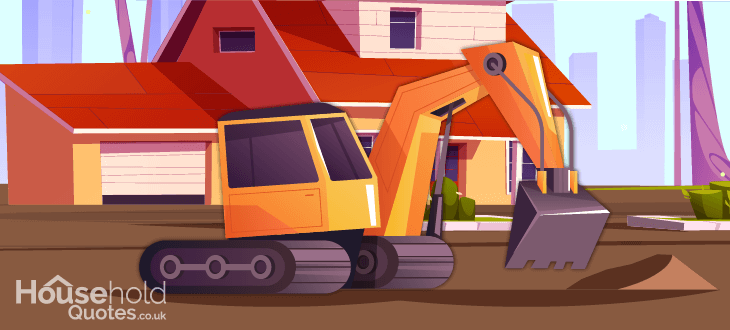
- Remove any vegetation and debris on your property,
- Excavate the site using a mini-digger. Typically, the depth should be between 150mm and 200 mm, but this depends on your chosen material.
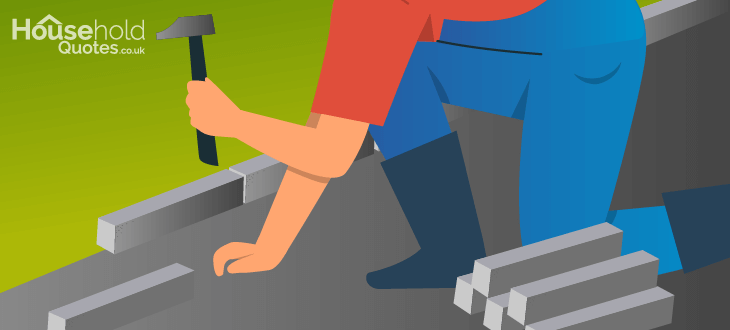
- Install edging around the driveway, this will help retain the shape of your driveway while also creating an aesthetically pleasing entryway.
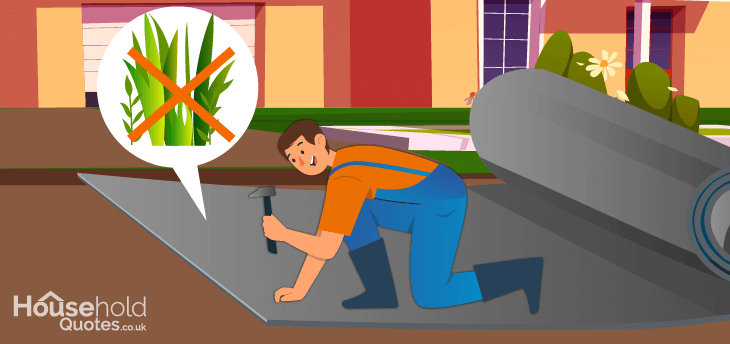
- Once the site has been excavated, add the weed barrier to prevent weeds from growing and reduce maintenance requirements.
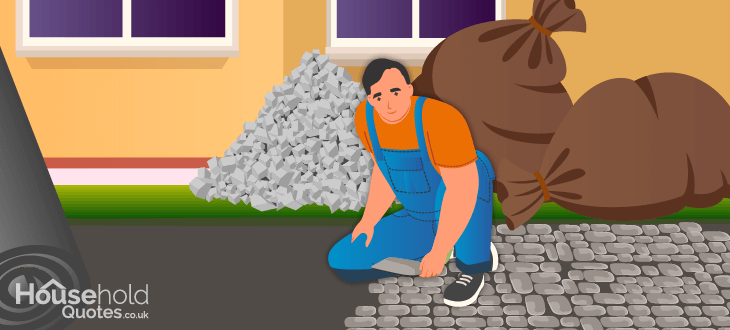
- Add a sub-base to the site to create a stable foundation, typically made from loose aggregates such as crushed stone.
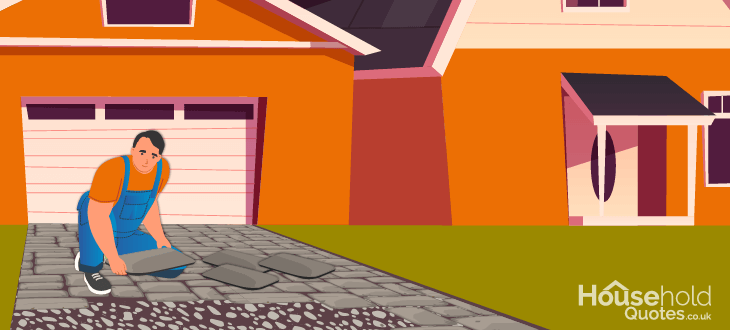
- Once the sub-base has been added, you can begin laying down your chosen material. Different materials require different methods and specialised equipment.
Understanding the necessary steps and researching the specific requirements for laying a driveway with different materials is crucial to ensure proper installation and to prevent future problems. Improperly installed driveways can result in issues such as sinking, cracking, and the formation of potholes.
Supplies for an inexpensive driveway
Creating an inexpensive driveway can be achieved by carefully selecting the right supplies. Below are the standard supplies and their costs for DIY driveways
| Supplies | Average cost |
|---|---|
| Mini-digger | £270 per day |
| Standard compactor | £19.80 per day |
| Shovel and spade | £15 to £40 |
| Demolition hammer | £20 to £40 per day |
| Trowel | £4 to £25 |
| Spirit level | £7 to £25 |
| Tape measure | £4 to £30 |
| Wheelbarrow | £55 to £550 |
| Skip hire | £105 to £305 per week, depending on size |
When planning a DIY driveway, it's essential to consider the costs involved. While you can rent some equipment to stay within budget, tools like shovels, wheelbarrows, and trowels must be purchased. Although you may save on labour costs, the expense of buying supplies will contribute to the overall price.
It's also worth noting that materials such as resin or concrete require additional equipment, like mixing tools, to create a durable driveway. This will further increase the cost of supplies.
Do it yourself driveway: labour timeframes and costs
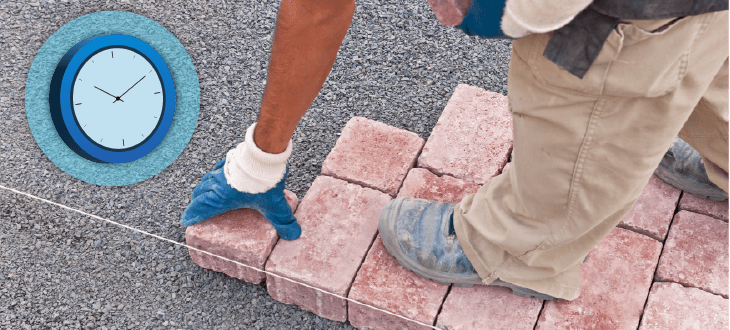
Labour costs typically comprise about 75 to 80% of the total cost of a driveway. By taking on a do-it-yourself (DIY) driveway project, you can save up to £1,000 on labour alone, as driveway specialists often charge between £150 and £200 per day.
The cost of labour may increase for larger driveways with more complex designs. Therefore, doing the driveway yourself can save on labour costs.
Here are the average timeframes for the most common driveway materials in the UK:
| Driveway material | Timeframes |
|---|---|
| Gravel | 1 day |
| Asphalt or tarmac | 1 to 2 days |
| Resin | 1 to 2 days |
| Concrete | 1 to 3 days |
| Block pavers | 5 to 7 days |
It is also important to note that many driveway materials require a curing period. This means that your driveway must be left untouched after installation without pedestrian or vehicular traffic.
| Driveway material | Curing timeframe |
|---|---|
| Gravel | Immediate use |
| Asphalt or tarmac | 48 to 72 hours |
| Resin | 72 hours |
| Concrete | 24 to 48 hours |
| Block pavers | 24 to 48 hours |
The above timeframes are estimates for professionally installed driveways. For DIY driveways, the labour timeframes may vary depending on your knowledge and expertise in driveway installation.
Consider partnering with a driveway specialist to ensure a successful DIY driveway installation. Their expertise will expedite the process and guarantee a flawless outcome. By preventing issues like cracking and sinking, you can avoid future repair costs.
Household Quotes offers four complimentary quotes from local driveway specialists to guide you through your DIY project. Take advantage of this opportunity to save time and money. Fill out our 30-second form to receive these quotes promptly. Click below to seize this opportunity.
- Describe your needs
- Get free quotes
- Choose the best offer
It only takes 30 seconds

DIY wooden driveway gates and other accessories
Understanding how to build a driveway involves more than just laying down the materials. It also requires considering the additional features you may want to include.
Implementing DIY accessories such as lighting and gates can enhance the entrance to your home while also improving security and safety. By adding some DIY accessories to your driveway, you can save on installation costs while also feeling accomplished.
A well-designed and properly installed wooden gate can enhance your property's curb appeal and increase your home's security. According to PriceYourJob, the average cost of a wooden gate is around £750. If you install the gate yourself, you can save approximately £375 on labour costs.
Another feature you can add to your DIY driveway is lighting. Various outdoor lighting options, including solar panels and lanterns, are available in most hardware shops. Prices for outdoor lighting can vary depending on the quality and type, ranging from £4 to £150.
You can install a security alarm for your driveway by yourself. Driveway alarms are handy for those with longer driveways because they notify you when someone enters your property.
Even with a shorter driveway, an alarm can enhance the security of your home. Depending on your chosen type, a driveway alarm can cost between £40 to £150. We recommend opting for a higher-quality alarm system to ensure accuracy and added protection.
Our top 3 DIY driveway ideas
Revamping your driveway can be simple and rewarding with our top three DIY ideas that blend functionality and aesthetics. Below, we discuss our top choices for DIY driveway ideas suitable for different needs:
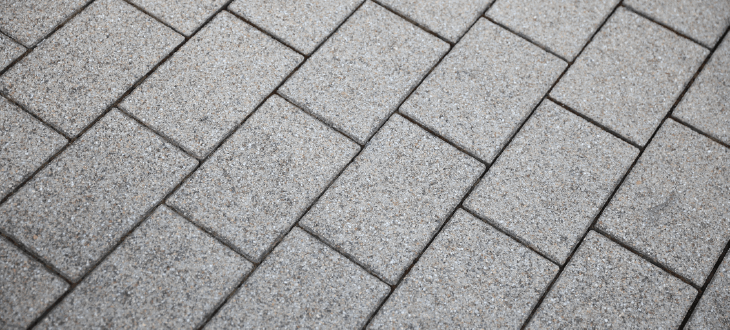
Permeable pavers are an excellent choice for a DIY driveway due to their environmental benefits and practicality. These pavers allow water to seep through the surface, making them ideal for sloped or steep driveways. They reduce runoff, promote groundwater recharge, and help prevent flooding and erosion.
Additionally, they are a more cost-effective option for those with a steep or sloped driveway, as they eliminate the need for installing a drainage system, which can cost up to £1,000.
Permeable pavers are relatively easy to install and maintain, making them a feasible project for DIY enthusiasts.
Furthermore, they come in various styles and materials, allowing you to create a visually appealing and sustainable driveway that complements your home's aesthetic while contributing to better water management and environmental health.
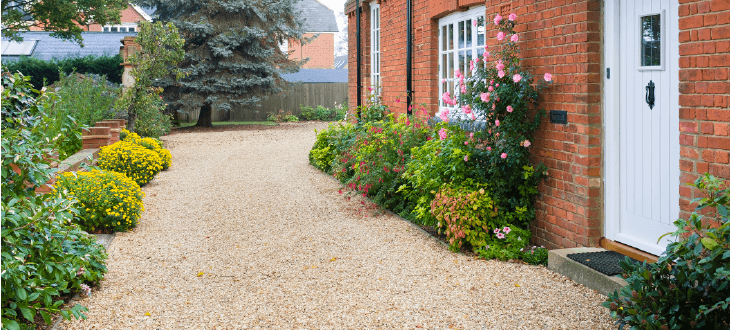
Gravel is an excellent choice for a DIY driveway due to its affordability, ease of installation, and natural aesthetic appeal.
It's one of the most cost-effective materials available, making it accessible for those on a budget. Installing a gravel driveway typically takes less than a weekend and requires minimal tools.
It requires basic preparation of the ground and spreading of the gravel. Gravel driveways offer excellent drainage, which helps prevent water accumulation and erosion.
Additionally, gravel's rustic charm can enhance your property's visual appeal. Maintenance is easy, as you can periodically add more gravel to maintain its appearance and functionality. These factors make gravel a practical and attractive option for DIY driveway projects.
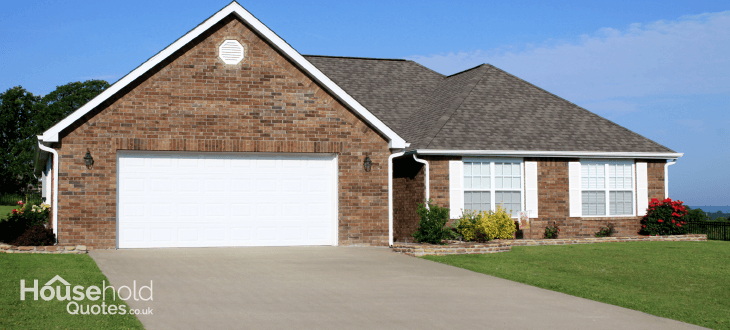
Concrete is a great option for DIY driveways because of its durability, versatility, and relatively simple installation process.
With the proper preparation and equipment, you can pour and finish a concrete driveway yourself, saving installation costs.
Once properly cured, concrete driveways can withstand heavy vehicle traffic and resist weathering, cracking, and erosion.
Concrete provides numerous customisation options, including imprinted or coloured variations that can align with diverse aesthetic preferences.
With proper maintenance, such as sealing and occasional repairs, a concrete driveway can last for decades, providing a long-term investment in functionality and curb appeal.
- Describe your needs
- Get free quotes
- Choose the best offer
It only takes 30 seconds

FAQ
Gravel driveways are the cheapest option, costing between £35 and £55 per m2. They are cost-effective because they are widely available and easy to install.
The cheapest driveway material is gravel. Gravel is readily available and inexpensive compared to asphalt, concrete, or pavers. Furthermore, it is easy to install, abundant in supply, and easy to maintain.
The cheapest option for a sloping driveway is to use permeable pavers. These pavers allow excellent drainage, preventing flooding and water pooling around your home and vehicles. Additionally, they provide better traction and accessibility than other affordable materials like gravel.
In the UK, building a budget-friendly driveway requires careful planning. Before you start, you must check local building regulations to ensure that your driveway meets requirements and avoids fines. To save on costs, consider DIY-ing your driveway, which can cut labour expenses by 75 to 80%. Opting for a cost-effective material like gravel can reduce material and installation costs.
